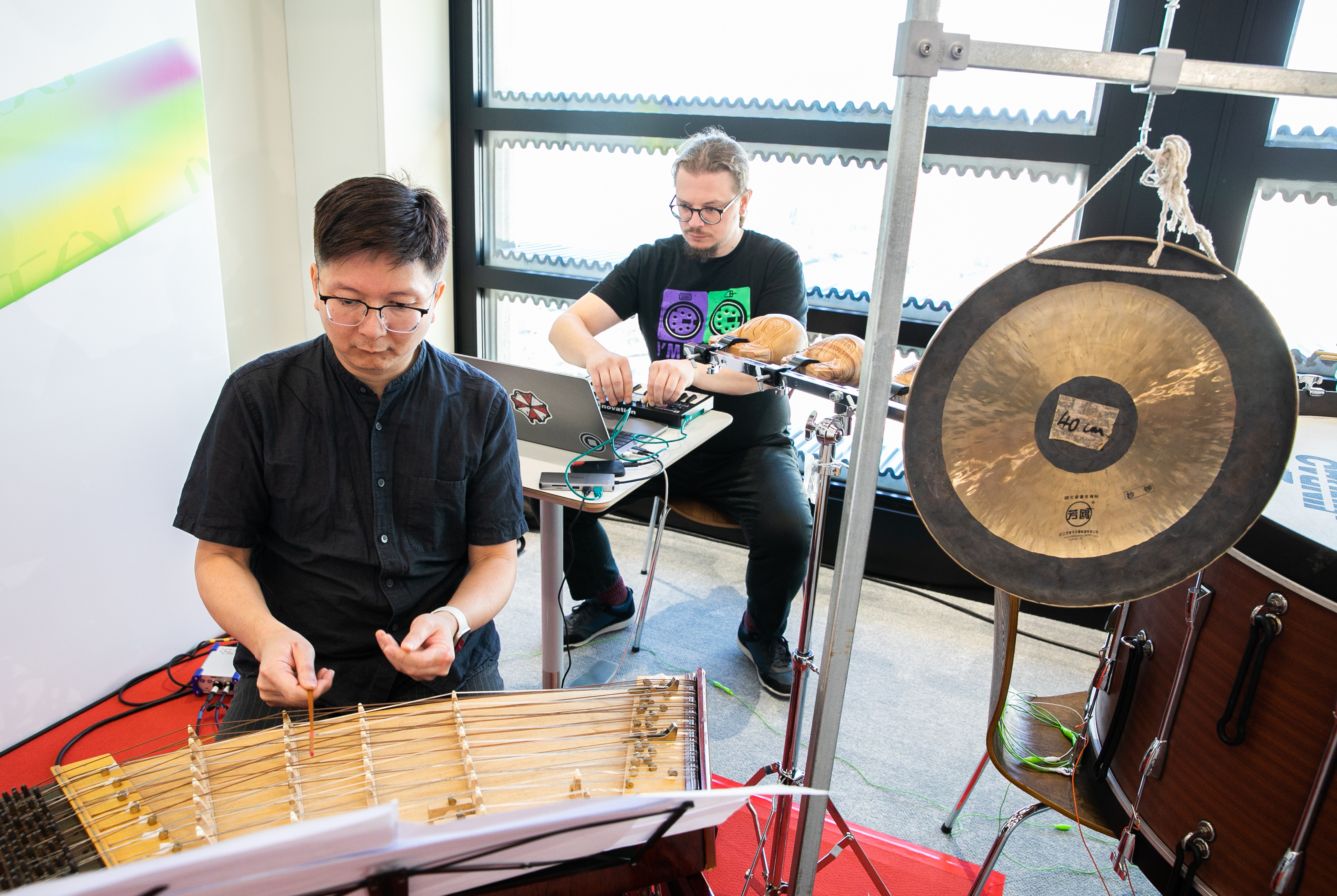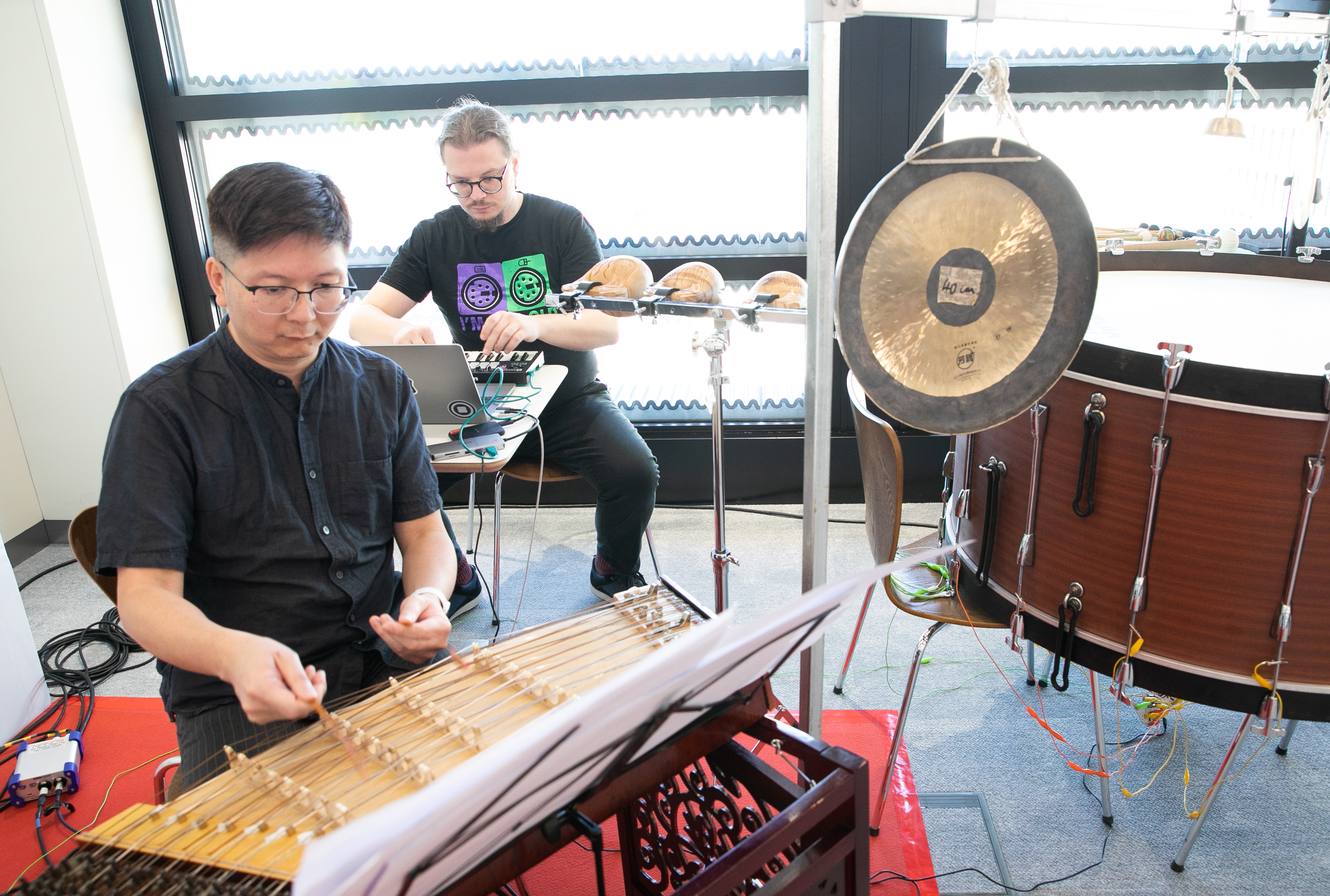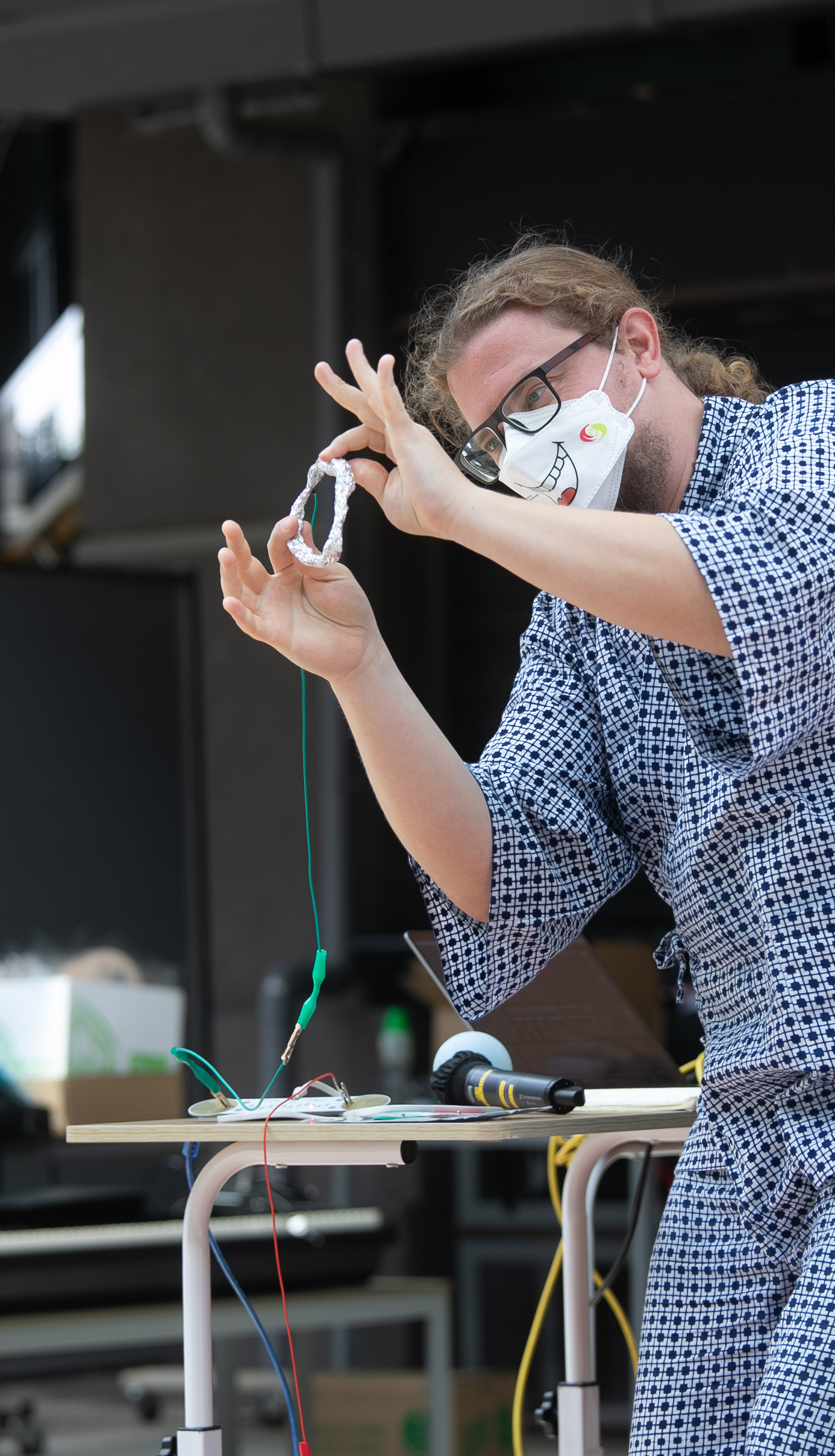
6 minute read
An auditory touch of connection
Text: Chan LT
Photos: Hazel Chow
Musical duo from Wong Bing Lai Music and Performing Arts Unit: mixing AI with traditional notes
Watch now: https://youtu.be/4S-IhcP0pV8?si=PwK1HLbI3kupdnYx

It is apparent from the way the performance of Touch/Connected is set up that this is no ordinary musical recital. Bamboo hammers strike a yangqin to produce deliberately distorted notes, while the other half of the duo shifts swiftly between woodblocks, a symphonic bass drum, a rack of opera gongs and a laptop. The resulting cacophony depicts an undulating soundscape, occasionally becoming an electrifying tone. Like the 13 percussion instruments in Edgard Varèse’s Ionisation and the asymmetric strums in Hora ţ iu R ă dulescu’s The Origin, an acoustic bass drum permeates the rhythmic texture of Touch/Connected, steadily lifting the crescendos and giving depth to the composition with a rich resonance.
Interspersing the composition, a female voice narrates, guiding the audience into the music.
The two presenters of this innovative musical performance, Prof Ip Kim-ho and Dr Enrico Bertelli, describe the process of constructing the piece as a series of controlled improvisations, a culmination of five decades of dedication and exploration into music and innovation both on and off stage. In their continuous pursuit of social entrepreneurship in the music industry through collaborations with artists, museums, institutes, and community organisations across the UK and Germany, their friendship developed through many serendipities and quickly blossomed into a rewarding partnership dedicated to democratising music and introducing it to a wide variety of audiences.
Touch/Connected is a manifestation of their foray into collaborative composition, which developed from a work by Prof Ip, Professor of Practice at Lingnan University and Head of the Wong Bing Lai Music and Performing Arts Unit, back in January 2023. Dr Bertelli, Associate Professor of Practice of Lingnan and founder of Conductive Music, is the mastermind behind the instrumental arrangement.


Inspired by the I-Ching, sacred Buddhist texts, and 20th century avant-garde noise music, the score slides fluidly between Western and Chinese percussion instruments, and between tradition and innovation, as illustrated by the oscillation between the touch of fingers and buttons.
“Our intent was to craft a piece that not only speaks to the audience, but also transcends typical auditory experiences often bordering on the misunderstood,’ Prof Ip declares. ‘Any misinterpretation we encounter is not a setback, but rather an affirmation of our role as pioneers in the ever-evolving landscape of music.”
Combining their expertise in Western contemporary music, Eastern traditional sounds, electronic music, and creative coding, their music allows them to transcend cultural boundaries in their mission to eradicate music’s association with elitism, and make it accessible to not just the “talented” but to everyone. With the help of collaborators in the Music Unit, they have been able to diversify their pedagogical approach and immerse students in heterogenous forms of music-making, performance, and appreciation.
The work experiments with the harmonic and contrasting relationships between Western and Chinese percussion instruments, as well as electronic components such as live sound processing and sample triggering. Prof Ip and Dr Bertelli even ventured into uncharted territories by bitcrushing the yangqin’s sounds into what may sound like technical interferences. Their creativity seems limitless– and they have further stepped it up by incorporating a tactile dimension into the performance, where each tensioner lug of the bass drum is electrified to augment its vibrations so the 16 lugs function as interactive buttons that trigger a series of dominant chords. The technical principle is similar to a mobile touchscreen: the musician completes the electric circuit by contact with the instrument, in turn generating a chord on a software-based electric piano.
Indeed, this method enables a tangible, intimate, and truly interactive relationship with music, which is indispensable in an education centred on accessibility and care. Capacitive sensing has been integrated in various workshops at Lingnan, including the Link Sound Sinfonia project designed for students with special educational needs.
This vision of nurturing a more inclusive and expansive understanding of music is in perfect alignment with the ethos
of Lingnan University’s liberal arts education, which strives to broaden perspectives, foster creativity, and encourage a holistic understanding of the world. “We aim to inspire our students to embrace music not just as an academic subject, but as a versatile and enriching part of their personal and professional lives,” Prof Ip says.
The same versatility can also be seen in AI development in music and live performance. AI is often presented as a threat which may overshadow or even replace human artists in the ongoing discourse around its integration into music. However, Prof Ip offers another perspective, explaining that while current tools and services – such as iZotope plugins and LANDR – are capable of high-performance in automating repetitive aspects of audio engineering, AI is yet to meet the mark of human creativity when it comes to fulfilling customised or high-quality conditions. AI’s audio modelling capacity remains limited as it tends to produce predictable output, but it effectively liberates artists from repetitive and technical tasks so as to allow time for original elements and humanistic charm such as establishing personal connections during live performances.
“AI should be viewed as a complementary tool rather than a replacement,” Prof Ip observes. “What we are truly excited about is the prospect of an AI that can improvise in tandem with a human performer, learning their style and anticipating movements.” The possibility of supplanting human musicianship and creativity is still, Prof Ip and Dr Bertelli conclude, unattainable at this stage of AI development.
Forecasting AI’s evolving influence on music and education, they anticipate the possibilities that the AI revolution and transition to Web3 will present, and look forward to the new Music Unit hub on Lingnan’s campus, which will prompt new musical experiences and peer collaborations between traditional musical forms such as Chinese opera and cutting-edge, AI-driven methodologies.
Standing at the intersection of music, technology and education, Lingnan’s scholars have always been active composers and conductors of the future. The University’s pioneering course, which synthesises data science, Generative AI, and music production, is currently being refined to engage all students – regardless of academic background – with the learning experience; simultaneously, a new minor programme in music with a special focus on GenAI is in a developmental stage to pave the way for future postgraduates in this dynamic and vigorous field of study.










